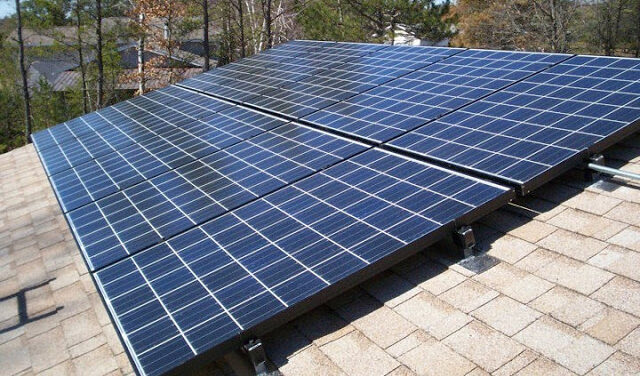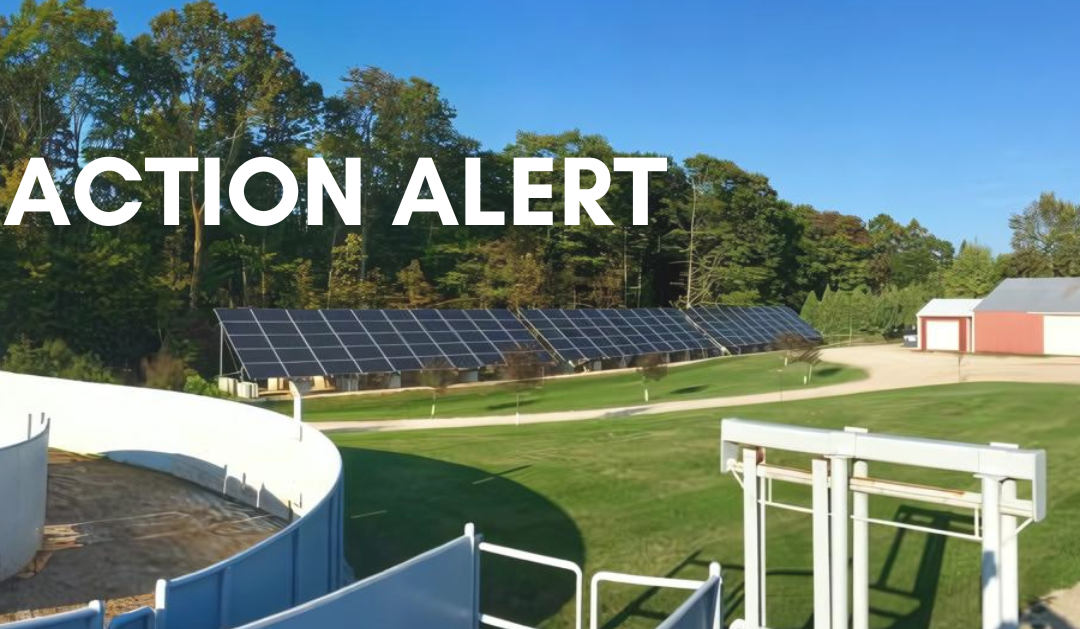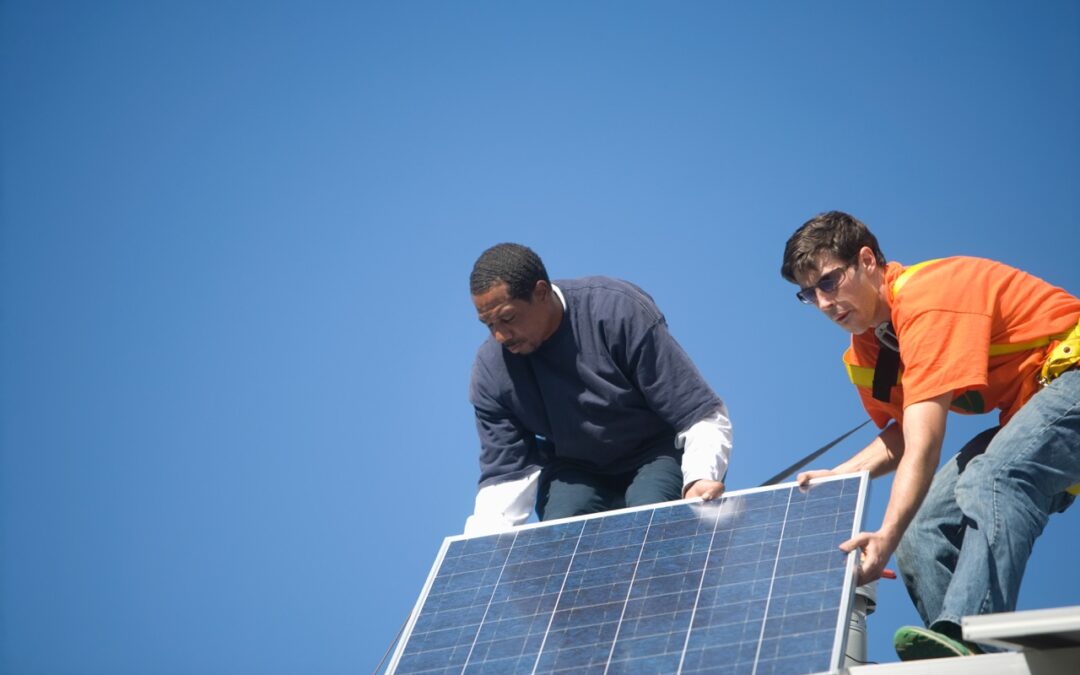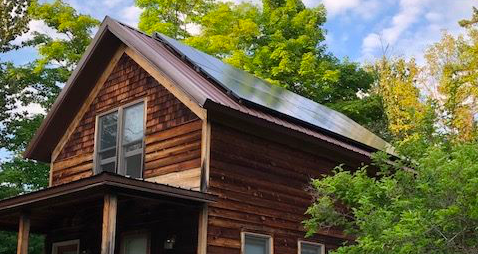
by RENEW Wisconsin | Oct 25, 2024 | Net Metering, Policy, Solar
A Brief History on Recent Net Metering Decisions at the State Level
In 2023, Wisconsin utilities proposed to dramatically change Net Energy Metering (NEM) policies in the areas they provide energy. Such changes would have reduced the financial benefits for consumers with solar arrays at their homes or businesses. These proposals were ultimately rejected by the Public Service Commission of Wisconsin (PSC), however, the Commission agreed to gather more information in a separate statewide investigatory docket. RENEW staff wrote a blog on this topic last November.
This past March, the PSC reopened an existing investigation into parallel generation, also defined as consumer-generated electricity, to direct the future of NEM policy for the state of Wisconsin. Commission staff also issued a memo for comment on issues related to NEM, and requested information and analysis on these issues, including how Wisconsin could approach a potential Value of Solar Study (VOSS). Along with several other organizations, RENEW submitted comments to the PSC with regard to how the PSC should approach a VOSS and other analytical aspects of NEM policy.
Explaining the PSC’s Recent Decision on Net Energy Metering Policy
After gathering comments and information on VOSS, on September 26 Commission staff posted a memo outlining potential next steps, and the Commission quickly discussed and made a couple of important decisions. During the open meeting, the Commission announced that Commission staff have been working with Berkeley Lab and other national lab staff to conduct a nationwide VOSS literature review. The Commission decided to take no action until more information is gathered.
The Commission essentially decided to:
1) Wait until this VOSS literature review is complete
2) Post VOSS literature review for public comment
3) Decide what the next actionable steps are in the investigation
If interested, you can watch the YouTube archive of this meeting, with the NEM investigation discussion starting at the 3:20 mark.
Given the need to gather more information, RENEW believes that this was a good decision by the Commission. It shows that the PSC will use a deliberate process in this investigation and associated analyses, and is not interested in making immediate changes to NEM policy. RENEW staff are keeping an eye out for the results of the VOSS literature review and look forward to commenting and suggesting next steps for the PSC to consider.
Recent PSC Decision on Parallel Generation Buyback Rates
While the Commission further investigates NEM policy, the agency has also been actively revising utility pricing for large solar systems sited by businesses for their own use. The price a utility pays for energy generation beyond a customer’s needs is listed in its parallel generation buyback rates for systems above NEM thresholds.* While the Commission has already revised buyback rates for Wisconsin’s five major investor-owned utilities, it has also begun to consider municipal utility-proposed revisions. RENEW staff wrote a blog regarding Sturgeon Bay Utility’s proposed parallel generation rate revisions this past May.
During an open meeting discussion on October 10, the Commission considered Sturgeon Bay Utilities’ (SBU) proposal to revise its buyback rates. The Commission decided that it needed more information before revising SBU’s buyback rates, and requested that Commission staff reopen the docket to gather more information and analysis through an extended proceeding. The Commission’s decision on SBU’s proposed change could have sweeping impacts across the state as SBU is part of WPPI Energy, which has many municipal electric utility members in Wisconsin. WPPI has stated that it would like to revise all its municipal utilities’ parallel generation buyback rates in line with the Commission’s decision in the SBU case.
Next Steps on NEM and Parallel Generation Buyback Rates
In the coming months, RENEW expects several important Commission decisions in both the ongoing NEM investigation and individual utility parallel generation cases. RENEW staff will follow upcoming Commission developments closely and will directly participate with witness testimony and public comments. You can follow these issues as well, and make your voice heard when public comment opportunities arise. Sign up for RENEW updates and action alerts so that you can provide timely input on these important issues.
*NEM thresholds vary across Wisconsin utilities. WE Energies has a 300-kilowatt (kW) threshold, NSPW and MGE have 100 kW thresholds, WPL and WPS have 20 kW thresholds, and all other Wisconsin utilities regulated by the PSC have a 20-kW threshold.

by Alex Beld | May 2, 2024 | Action Alert, Advocacy, Net Metering, Public Service Commission
Sturgeon Bay Utilities (SBU) has filed an application with the Public Service Commission of Wisconsin to revise its parallel generation tariffs, significantly altering the way SBU compensates electric generation from its customers who go solar. SBU’s wholesale provider, WPPI Energy, has stated that it intends to replicate these proposed changes with all of its municipal electric utilities in Wisconsin. Check here to see if your utility could be affected.
If accepted, SBU’s proposal would modify its net metering tariff so that excess generation at the end of each billing month would be subject to wholesale rates instead of retail rates. For larger solar installations (above 20 kilowatts), SBU proposes that all excess generation is subject to volatile wholesale prices, which are typically low and subject to annual changes.
RENEW Wisconsin is the only intervening party in the case and has submitted testimony arguing to preserve net metering and pay larger solar installations (at schools, hospitals, and businesses) at rates that reflect SBU’s avoided costs, which is defined as the amount the utility saves when their customers generate solar power. See RENEW’s direct testimony for details.
The PSC has opened up the public comment period in this case (docket 5780-TE-111). You have until the end of the day on May 9 to submit your comments to the PSC. Tell the PSC to ensure that there is an economic pathway for customers to go solar. We need to preserve net metering for all customers in Sturgeon Bay and the rest of Wisconsin and pay fair rates for larger customer-sited renewable facilities.

by Alex Beld | Nov 10, 2023 | Advocacy, Net Metering, Policy, Press Release, Public Service Commission, Utilities
The Public Service Commission of Wisconsin (PSCW) unanimously voted to keep net metering for Wisconsin Power and Light (Alliant) customers yesterday. Last week, PSCW denied Madison Gas & Electric’s proposal to eliminate net metering. These two decisions create certainty for Wisconsin’s solar industry and customers.
Traditional net metering is currently the most important policy tool Wisconsin has to fairly compensate rooftop solar owners and incentivize future solar installations. This model supports Wisconsin’s thriving solar industry, offers good-paying jobs, and helps Wisconsin reach its decarbonization goals. When the time comes to transition away from net metering, collaboration between clean energy advocates and utilities will be essential to ensure that the transition is equitable and values each customer’s solar installation.
The revised version of the Power Partnership would have preserved key aspects of net metering while creating new benefits. The adjusted proposal offered a durable framework that recognized the value of each customer’s solar installation to Alliant’s infrastructure. Power Partnership limited the risk to installers, ensured a steady revenue stream to solar customers, and provided a solid growth path for solar and storage.
We stand behind our work with Alliant to create a viable solution for the solar industry. We believe there is a path forward for a collaborative effort to ensure the benefits of clean energy are shared throughout the state. And we are grateful for the successful advocacy work of other intervenors and clean energy advocates in defending net metering. We look forward to continuing our collective work to ensure the benefits of clean energy are shared throughout the state.

by Alex Beld | Nov 3, 2023 | Advocacy, Net Metering, Policy, Press Release, Public Service Commission, Utilities
The Public Service Commission of Wisconsin (PSCW) delivered a unanimous decision on Friday to keep net metering in the Madison Gas & Electric (MGE) territory. This action is a win, not just for MGE customers but for all of Wisconsin.
“It almost felt as though it was a half-hearted proposal, and so I didn’t feel like there was enough information to support authorizing it [MGE’s proposed net metering change],” said PSCW Chairperson Rebecca Valq. “… for Wisconsin to have a consistent approach to net metering, I would not approve this proposal.”
There was overwhelming support to keep net metering in MGE’s service territory. There were 500 members of the public and 14 intervenors, including RENEW, who opposed MGE’s proposed net metering changes. This collective effort played a vital role in ensuring rooftop solar will remain financially viable for MGE solar customers.
This decision from the Public Service Commission of Wisconsin represents a major win for rooftop solar and the solar industry in Wisconsin. Net metering is fundamental in ensuring that rooftop solar owners are properly incentivized and compensated for their energy generation. We look forward to working with other utilities to ensure residential rooftop solar and large-scale renewable projects remain viable tools for meeting Wisconsin’s decarbonization goals.
Net metering has a direct impact on the local economy. The installation, maintenance, and servicing of rooftop solar systems creates employment opportunities, providing long-term benefits for Wisconsin communities and businesses. RENEW is celebrating the decision made by the PSCW today to ensure equitable access to solar for all Wisconsin families and create certainty for local solar installers.
The collective efforts of our members, partners, and the general public were crucial in the effort to protect net metering. Thank you to everyone who made their voices heard in the MGE rate case. We look forward to hearing from the PSCW again later this November when they deliver their decision for the Alliant Energy rate case.

by RENEW Wisconsin | Sep 25, 2023 | Advocacy, Net Metering, Policy, Public Service Commission, Utilities
RENEW Wisconsin and Alliant Energy have agreed to preserve net metering for two years and have created a clear pathway for future rooftop solar installations. At the end of the two-year period, new Alliant solar customers will shift away from net metering and into Power Partnership, a proposal that will support the sustainability of the solar industry.
Power Partnership preserves key aspects of net metering while creating new benefits. The agreement is a compromise that offers a durable framework that recognizes the value of each customer’s solar installation to Alliant’s infrastructure. Power Partnership limits the risk to installers, ensures a steady revenue stream to solar customers, and provides a solid growth path for solar and storage.
Additionally, after net metering is fully phased out, Power Partnership will continue to provide customers and installers with the information they need to estimate payback periods for new installations. This was a non-negotiable aspect of RENEW’s agreement with Alliant.
This is a win for the solar industry and wouldn’t be possible without the incredible grassroots efforts of every person and organization who submitted public comments and testimony to the Public Service Commission of Wisconsin. This unified action helped bring Alliant to the table.
These collective efforts gave us the opportunity to bargain from a strong position and have a voice in crafting what a net metering transition in Wisconsin looks like. This agreement creates certainty for the solar industry and the customers who support it, in both the short and long term.
Key Aspects of the Proposal:
- New customers with installations under 20 kW will be able to choose between net metering and Power Partnership until Dec. 31, 2025.
- Net metering customers will receive legacy treatment until 2032.
- Bill credits earned under Power Partnership will carry over on a monthly basis for one year.
- Power Partnership will expand access to installations between 20 kW and 75 kW.
- Alliant will create a payback calculator to help customers plan financially for their solar installations.
- Customers will have a minimum charge of $10 per month for installations up to 20 kW and $15 per month for installations between 20-75 kW. This charge will not apply to current net metering customers.
Transitions away from net metering are rarely this favorable to solar customers, and we are grateful for Alliant’s collaboration and the organized support of clean energy advocates. RENEW still believes that net metering is the best policy for Wisconsin’s current solar industry, and our opposition to MGE’s proposal continues. We hope that we can depend on your support in that effort.

by Heather Allen | Mar 25, 2022 | Advocacy, Net Metering, PSC Priorities, Solar
RENEW Wisconsin, together with a coalition of Clean Energy Advocates (Clean Wisconsin, Environmental Law, and Policy Center, Vote Solar, The Nature Conservancy, Wisconsin Conservation Voters, and the Wisconsin Health Professionals for Climate Action), submitted comments this week to the Public Service Commission in favor of protecting and improving net metering in Wisconsin.
The Commission asked for remarks on four key questions and shared a 60-page memo from the Regulatory Assistance Project describing net metering policy issues, changes to net metering in other states, and several other aspects for consideration. The comment period closed on Tuesday, March 22, 2022.
Wisconsin’s customer-owned solar market is falling behind our neighboring states due to a patchwork of service terms and artificial market barriers. Our coalition comments highlighted several key factors contributing to the issue:
- The absence of a statewide net energy billing policy has fostered an inconsistent and confusing patchwork of tariffs across Wisconsin.

2. Low net energy billing ceilings and low export rates effectively exclude many larger customers from investing in solar systems.
3. Encroachment of utility-owned DG reduces behind-the-meter installation opportunities for customers and solar contractors.
4. The lack of clarity over third-party financing hampers the solar marketplace.
Solar installers, solar customers, clean energy advocates, and climate activists submitted comments echoing these themes. Here are some quotes from the commenters:
“The time has come for the Wisconsin Public Service Commission (WiPSC) to take a customer-centric approach to address the need for dramatic greenhouse gas emission reductions.”
Kerry Beheler and Gary Radloff
Wisconsin GreenFire
“Larger commercial and industrial customers should be allowed to net meter on larger projects that help them displace a greater percentage of their usage with on-site renewable generation. Adjacent states have raised net meter limits above 1000 kW for these customers. State goals of increased renewable energy are efficiently met with an on-site generation that is offsetting load, and this also possibly reduces the need for additional transmission infrastructure. Net metering is one good tool encouraging on-site renewable generation.”
Weselley Slaymaker
“I support a robust net metering policy for Wisconsin. The adaptation of solar power is critical for our energy independence and to mitigate the impact of climate change.”
Megan Stansil
RENEW and its allies explained their priority to improve net metering in the near term to “make net billing tariffs more consistent across Wisconsin utilities.” But we also urged caution that no other reform that could diminish customers’ value proposition for investing in these grid-beneficial technologies should be pursued before reaching much higher solar penetration levels and analyzing the impact of such potential changes.
Net metering is a valuable tool that helps customers generate their energy in a manner that provides both system and public benefits, including carbon emission reduction and economic development. It drives solar deployment and is easily understood and accessible to customers. RENEW will continue to participate in this conversation at the Commission and share results as this process moves forward. Wisconsin can improve customer transparency with a more uniform statewide approach but should be very cautious about risking the benefits of distributed generation by altering rate design.





